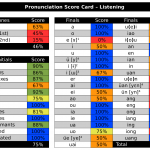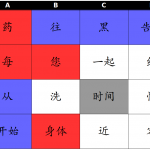Articles in the ‘Beginner’ category Page 21
-
Five text games for Chinese learners
This article is about five text games for Chinese learners. It both introduces the games and asks for feedback about how they can become even more engaging and fun. Each game contains on average roughly 10,000 characters, which makes them on par with a typical graded reader.
Read → -
Should you focus on learning Chinese words or phrases?
When learning Chinese, should you focus mainly on learning words or phrases? This question is not easy to answer and depends on a number of factors. This article breaks it down and discusses the pros and cons of each.
Read → -
Training and testing your ability to hear Mandarin sounds
Learning to hear the sounds in a new language is a very important step, both to understand it and to pronounce it yourself. This article gives you methods and tools for training and testing your ability to hear the sounds of Mandarin.
Read → -
Is it necessary to learn the stroke order of Chinese characters?
Stroke order can feel difficult and pointless for beginners, but if you want to be able to write Chinese characters, it’s important to get it right from the start. Instead of taking my word for it, let me explain why stroke order matters!
Read → -
Task-based Chinese learning and teaching
Task based language learning and teaching is built around working with tasks in the target language with a clear focus on meaning (communication). Focus on form should come after the task has been completed.
Read → -
Learning (or not learning) Chinese slang
Learning slang in Chinese can be fun, but it’s worth remembering that in most situations, it’s actually much less useful than more standard ways of expression. Slang is used in a limited context and changes quickly.
Read → -
Playing Codenames to learn Chinese and other languages
Codenames is one of my favourite games, and it also happens to be an excellent game for language learning! In this article, I suggest ways of playing it in Chines, along with a tool that generates grids of code words for direct use in the classroom or elsewhere!
Read → -
Comprehension-based listening vs deep end immersion
What works best for improving listening ability, graded content targeted at your specific level or deep-end immersion? The answer is that both approaches are necessary, but which you use depends a lot on practical considerations, as well as how much time and energy you have to invest.
Read → -
10 ways of using games to learn and teach Chinese
Games are great for learning languages. Here are ten ways you can use games to learn or teach Chinese as a second language!
Read → -
A student’s guide to comprehension-based learning
In this third and final article, the focus is on how students can make their own learning comprehension-based, with or without a teacher. It draws from the principles and ideas of the previous articles and allows you to apply these to your own learning.
Read →









